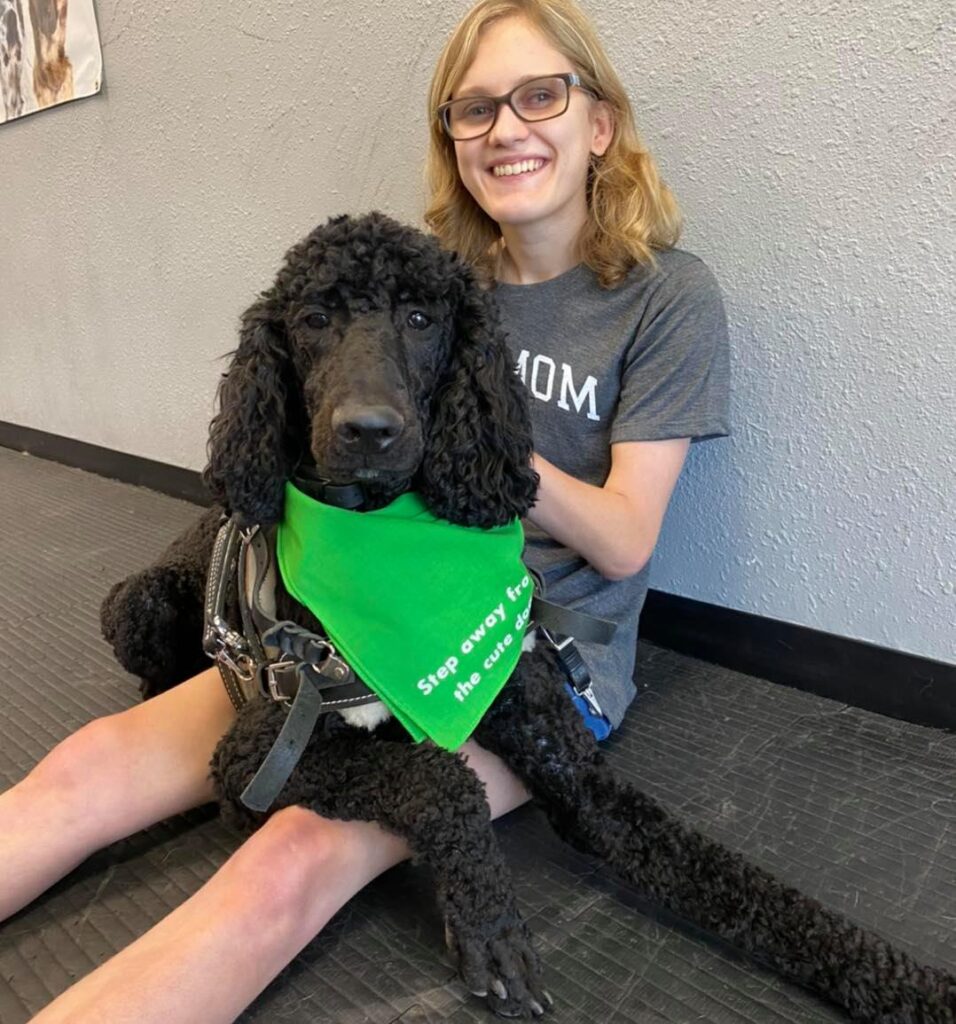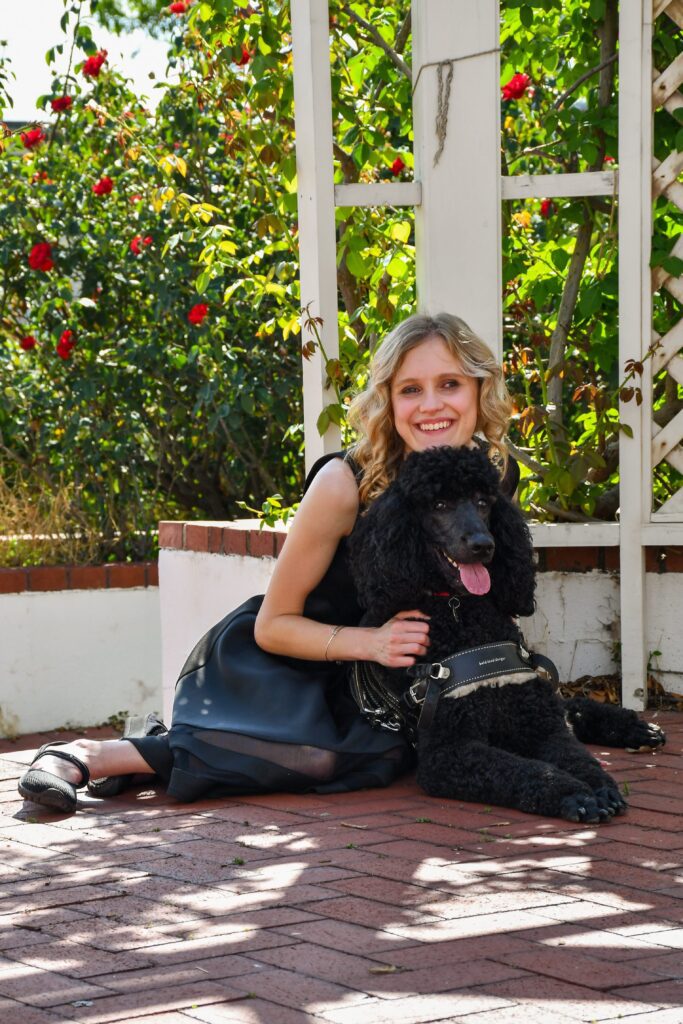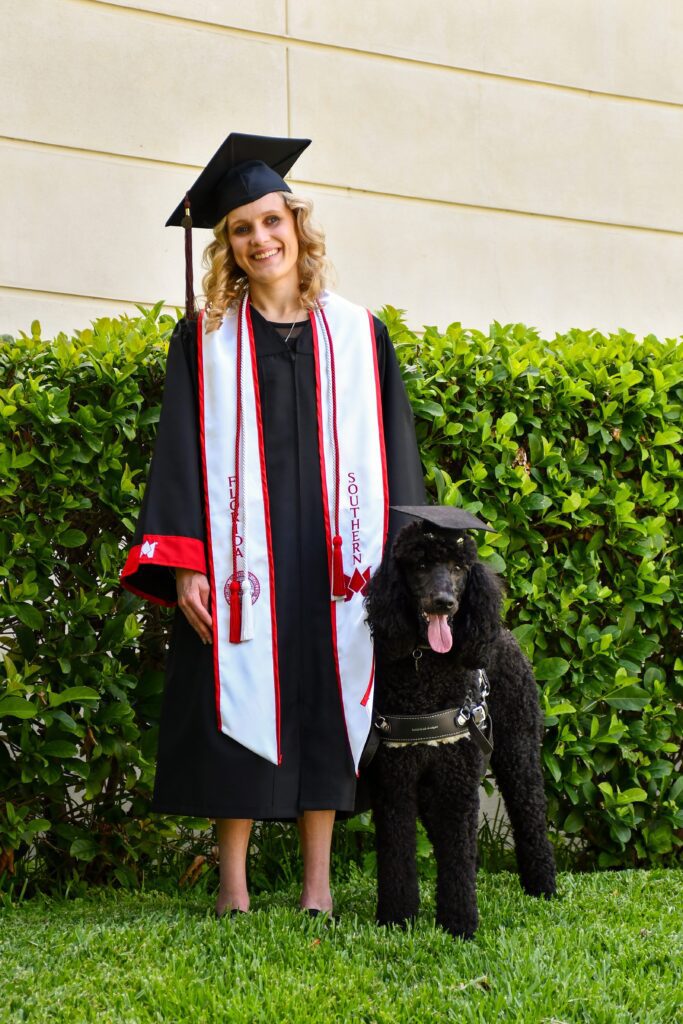Service Dog Gives Florida Southern Graduate New Independance
by K. MICHELE TRICE
photos by MOLLYE MILLER
In our society, individuals with disabilities are presented with challenges in their routines that people without disabilities never consider. Service animals can help overcome some of those challenges. Mackenzie Carlson of Winter Garden and her 3-year-old service dog, Atlas, are prime examples of this.
Carlson, 22, is legally blind in one eye and has cerebral palsy.
“My brain and legs don’t accurately communicate with each other,” she explains. She experiences tightness and tension in her legs and chronic pain. The tightness in her legs leads to balance issues.
Atlas, a Standard Poodle, is able to assist with the balance problems she experiences. He wears both a service dog vest and a mobility harness with two handles — one handle is used for counterbalance and the other is for forward momentum.
“He keeps me from falling or tripping,” she says. “If I do trip, he knows to stop and brace me.”
“Going to the store before getting Atlas, I would always have to have someone’s hand or the cart because momentum would be a thing,” she says. “Now, that isn’t an issue.”
“My family lives not far from Disney and are pass holders,” she continues. “I used to have to use my wheelchair for long distances or for situations where I would be standing for a long time. Since I’ve gotten Atlas, I can handle six to eight hours without the wheelchair.”
Carlson is a recent graduate of Florida Southern College in Lakeland and is a current participant in the Disney College Program. She will be continuing to work part-time with Disney when she finishes her time with the College Program.
Atlas attended classes on the FSC campus with Carlson and now goes to work with her at Disney’s Pop Century Resort. While he is a working dog, he is also still a dog and needs to play. In college, Carlson would give him play breaks between classes, and now he gets breaks before and after her shifts at work. She makes sure he is having fun despite the work.
Atlas and Carlson have been together since May of 2021, and Atlas was trained by ASA Service Dogs in Plant City. ASA owner Amanda Taulborg, who has a background in the medical field but still felt a calling to work with animals, formed the nonprofit service organization in 2013.
ASA Service Dogs is a 501(c)(3) nonprofit “committed to the training, education, and awareness of our global community regarding the critical role service dogs play in the lives of the people who need them by dramatically improving their quality of life.”
They provide service dogs, emotional support dogs, and therapy dogs (comfort dogs).
While Carlson is obviously an advocate for service dogs, she is also adamantly outspoken about people who purchase fake service animal vests for their own untrained dogs.
“Fake service dogs put real service animals and their handlers at risk,” she says. “It’s really dangerous when people do that. Respect that these are working dogs.”
“Kenzie and her service dog, Atlas, are a wonderful team,” Taulborg says. “He has helped with balance in more ways than one. From balancing college work and classes to walking her across the stage at graduation, now helping her balance full-time work and leisure, he is always eager to offer a helping hand, or should I say paw.”
Atlas has a multitude of commands and tasks he can perform, including providing deep pressure therapy by laying his body on Carlson, providing both heat and weight to ease some of her pain. Because of her vision impairment, Carlson takes comfort in having Atlas on her left side.
“I don’t have to worry about being bumped into; there’s a physical barrier there.”
When describing the benefits of a service dog, Carlson says, “Honestly, being able to do little things people take for granted — going to the store, theme parks with family, to hang out, some place new to me.”
ASA trained Atlas, then trained Carlson with Atlas as well. Her mother also received training with Atlas in the event that a second handler was ever needed.
“We did training in the beginning to practice commands,” she explains, “like going to the grocery store when we didn’t need anything. We had to build up that trust.”
“He trusts me that I won’t put him in a situation that would hurt him,” Carlson says. “I obviously trust him, and he trusts that I am keeping him safe to do his job.”
Carlson is an avid proponent of service dogs. “They increase your independence, and your confidence goes way up.”
“I can’t think of a better job than training dogs to help disabled humans, especially kids,” Taulborg says. “I have the honor of matching dogs with their disabled humans, and watching both of their lives bloom into a beautiful symbiotic relationship. I couldn’t be more grateful and proud to be part of each and every one of their stories.”




